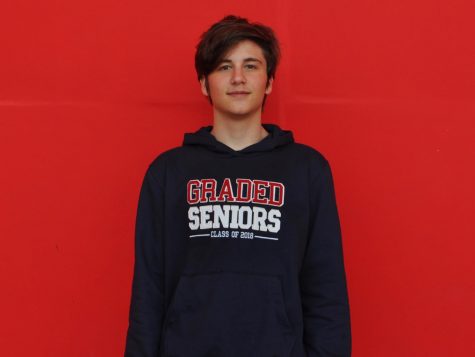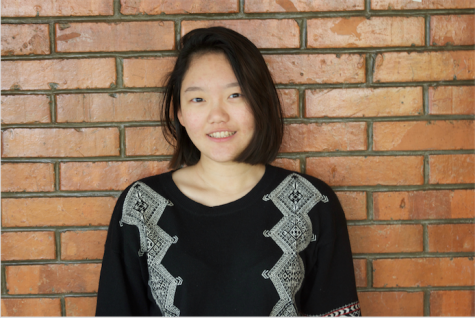Advice for rising juniors
The beginning of the second school semester at Graded is predominantly marked by a couple of demanding weeks of school followed by the Carnaval break. However, for sophomores this period is marked by great thought and inquiry. For them, it’s time to decide what IB (International Baccalaureate) courses they will pursue in the next two years of their academic lives. Such a task is not easy. During the first days of school this semester, Sophomores were asking questions about IB Higher Level (HL) courses, what science course they were going to select, and whether it’s worth taking 4 HL courses. Sophomores seeking for even more advice looked up to the juniors and seniors. Recently, Sophomores also attended grade-level meetings with IB coordinators and counselors in order to shape their decisions.
The IB Diploma Programme is a rigorous two-year program for highly committed high school students that offers a unique way of learning. Students are required to take ToK (Theory of Knowledge) class, where they challenge the knowledge that is taught to them, write an Extended Essay, which consists of 4,000 words on a topic that interests them, and run their own CAS (Creativity, Action and Service) website, where they reflect on their extracurricular activities and how they have contributed to the construction of their individual self. Not only that, but students need to take a total of six IB subjects from different subject groups; three Standard-Level and three Higher-Level courses. In order to choose the correct courses and decide whether the full diploma will be pursued, students are required to analyze teachers’ recommendations, acknowledge what courses they have achieved success in, reflect upon what courses they most love, and ponder what they will want to pursue in college years.
It’s worth stressing the importance of choosing the correct courses. King’s College, a constituent institute of the University of Cambridge, states that it is of paramount importance to select the correct IB courses. The Admissions Office from King’s College explains, “The subject choices you make within the International Baccalaureate (IB) Diploma curriculum can have a significant impact on the course options available to you at university.” Not only that, but it stresses that you need to choose courses that will foreshadow what you will pursue during college years. It endorses that if you want to study something related to science, it is imperative for you to ideally take two of the three science courses offered by the IB Diploma Programme at a Higher Level. In addition, it states that if you are going to study something related to math in college years, it is recommended that you take Mathematics HL and Physics HL in order to be successful and earn good grades in a course that relies on the fundamentals of such courses.
Overall, it’s important to not only regard the IB courses you are going to take as courses you enjoy, but also courses that will reflect your future. While selecting courses, it’s important to create a balance between what your heart tells you, and what you see yourself doing in the future. Questions worth asking are, “what classes do I feel most comfortable in?” and, “where do I see myself in three years?” Choosing courses is not an easy task. Sophomores must learn to combine their teachers’ recommendations, and their interests in order to achieve a solid IB curriculum that reflects their interests. Sophomores’ first major step toward their future is near.
Here is some helpful advice from current juniors and seniors on how to select IB courses:
YeJin On (Grade 11): Always choose IB subjects that you really want to do. Don’t make your friends and even your parents decide what IB subjects to take because you are the one that truly knows who you are. From my experience, I get better grades in the IB courses that I enjoy the most, so choose subjects that you actually love learning from. Also, always be alarmed to stay up late (due to the amount of work) and honestly, it does not hurt if you take 4 HL courses.
Saniya Joshi (Grade 11): The best advice that I can give on choosing your IB subjects is to listen to your teachers’ recommendations because they really are accurate, and give you a good sense of your academic abilities. However, if you need to take a class that goes against your recommendation for university or career purposes, go for it. I like to think that if you are passionate about a subject, especially if you see yourself pursuing it in the future, you will be able to commit to it in the IB.
Lucca Oliveira (Grade 11): In all honesty, the IB is tough, there is no way to sugar coat it. When considering which courses to take, you need to be mindful of three principal points: your desire to take the course, the requirements some particular colleges might have, and your actual ability to do well. The first one is self-explanatory; take courses you enjoy, whether it be Art, Languages or a particular Science. It’s easy to become sidetracked in the whole “three SL and three HL courses to fill your requirements” talk, so take the time to first isolate what truly sounds appealing to you and become more informed about those particular options. Secondly, some colleges require or prefer particular subjects to be taken. One example of this would be a student applying for medicine in the UK, which needs HL Chemistry and Biology, while a student applying for engineering might need HL Mathematics and Physics. Lastly, you must pay attention to your own academic fortitude. Teachers will give you recommendations to what level course they believe you would best fit, and I strongly believe you should consider them. The difference between an HL and SL course can be significant dependent on the class, but most have a large gap. All in all, take your time to chose because you will be spending the next two years with these subjects, for good or ill.
Max Caro (Grade 11): Entering your junior is the debut of a very demanding journey. Selecting courses is one of the important decisions you will have to make, especially for those wishing to receive the IB diploma. These class selections should be based off of personal interest. Therefore, I suggest that you research on your desired field of study to observe the courses universities often require. Also, listen to your teacher recommendations, as their perspective will guide you towards choices that best suit you. Be aware that it is very difficult to switch classes throughout your next two years, so be sure of your choices. Good luck!
Luis Wolfrid (Grade 11): Choose IB Film… and Band. The rest, no one can really give you any advice on, you just sort of have to do a little research on your own. It’s pointless for someone else to choose your classes. Just, no matter which courses you finally decide to enroll in, be aware that the IB workload is far from a joke.
Hyo Sang Kil (Grade 12): The IB programme can be either a scary tiresome hell or a simple stepping-stone for preparing for the future. What puts you in either one of these two pathways comes from the very beginning of the program: your class choices. That is why I recommend and hope that all the sophomores and possibly future IB students choose the right classes. In order to do so, you should know your limits; do not choose (and I repeat) do not choose classes for the sake of it looking good on your resume. Choose what will be the best for you. Look into the future and choose subjects that match and can prepare you for college, your career, and your dreams!
(Sources: kcl.ac.uk, ibo.org)

As a senior writing for the POV section, this is Fernando's third and final year as part of The Talon. His passions revolve around development economics,...

Lord YeJin strikes back once again in The Talon as the Photographer, the Layout Editor, and the Image Master (finally!). Evicting Gabriel Civita, the former...









